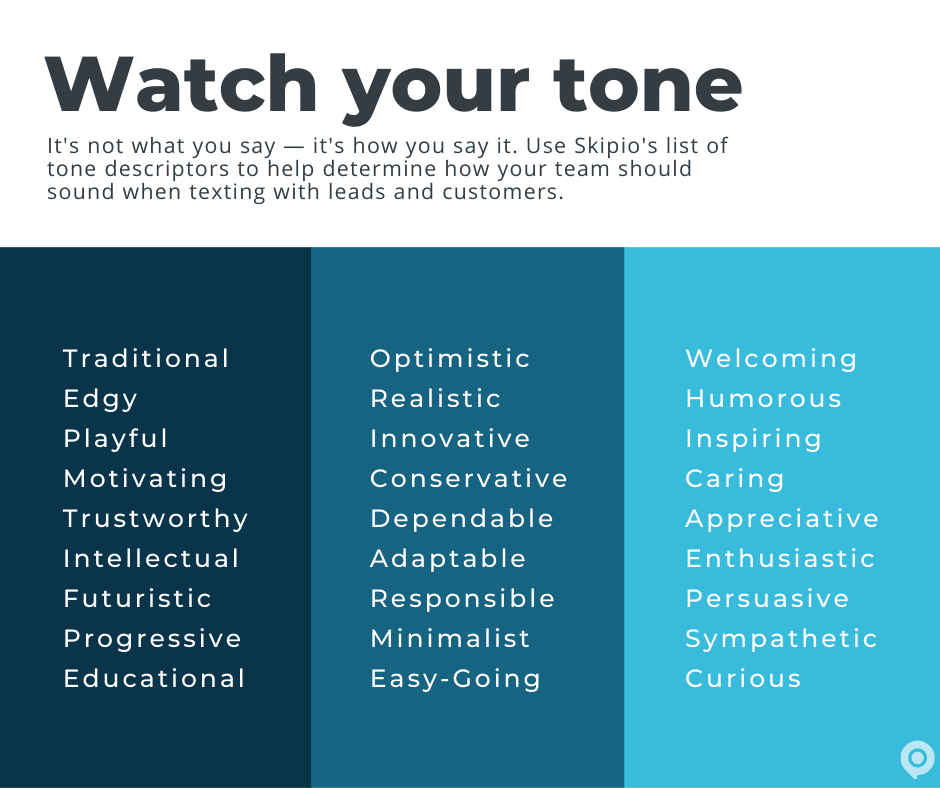
The way you communicate with customers reflects you and your brand as a whole. So how do you write better texts? Communicate with the proper tone.
Text messages are inherently less formal, but unless you really are best pals with your contacts, you probably shouldn’t be addressing them like you would your IRL friends. Business texting is still about business relationships.
Consider these two questions as you determine a focused tone for your messages to write better texts.
Who Are Your Customers?
If you don’t know your target audience, stop reading this article and figure it out now. This information directly influences all communication.
The answers to questions like these will help you determine the tone you should take when messaging your customers.
- How old are they?
- Where do they live?
- Are they single? Married?
- Do they have kids? Do they want kids?
- What’s their budget?
- Why do they want your products or services?
- Do they run a business of their own?
Different audiences will be familiar and comfortable with different types of language. And matching the tone of your messages to the audience you serve allows you to foster natural connections; it shows you understand your audience and how they want to be communicated with.
After all, a business that primarily targets and sells to recent college grads can sound much different in texts than a company that serves other businesses.
Similarly, how you talk with loyal customers, people you’ve built a rapport with, should be different than how you talk with potential clients or customers you’re hoping to bring in.
How do you want your customers to perceive you?
It takes a few seconds to read a text. So you only have a few seconds to influence how your customers perceive you. How will you build lasting relationships?
“Authoritative” texting
If you want customers to see you as a trusted resource, you likely want a more formal tone. Focus on language that reflects credibility and trustworthiness. After all, you are the expert in your field.
This doesn’t mean resorting to academic or technical writing, but keep things tempered. Be wary of language that feels condescending or alienating. You need your customers to trust you, not avoid contacting you.
If you run a more “traditional” business or offer more “serious” services, you’ll likely gravitate toward authoritative texting naturally. A post-meeting message might read something like this:
Thank you for meeting with me today! I really appreciate it and look forward to talking with you again on Monday. Please let me know if you have any follow-up questions.
Just don’t confuse authoritative or formal with impersonal. You’re not a robot! Convey genuine interest in each customer and their needs through your messages. And as you communicate more often with your customers, you can adapt your tone.
“Friendly” texting
You should always be friendly with your customers, but some business-customer relationships allow for a more familiar relationship.
For example, a personal trainer who interacts with their clients on a daily basis can afford to take a more informal tone while texting. These are people they know and talk to often – texting with them should reflect that.
A “friendly” follow-up message might instead read something like:
Thanks for meeting up today! Can’t wait to talk to you again next week. Don’t hesitate to shoot me a text with any questions.
However, be careful to not become too friendly. Yes, using slang may be appropriate for your audience, but used in the wrong way or too often it could also make your customers think you aren’t taking them or their needs seriously. Set tone boundaries and don’t overstep them.
What’s Your Brand Voice and Tone?
Use this list of words, in conjunction with your business goals and what you know about your target audience, to start focusing your messaging tone. How do you want to sound?

Once you choose a tone that reflects you and your business, start using it. It may take a few tries to get the wording right. Then train anyone writing texts on how to use the proper tone. That way everyone will write better texts.
Your tone can and should change depending on who you’re communicating with. And your customers know how to spot insincere attempts at connection. How you sound on your website, in real life, and through text should all be complementary.



